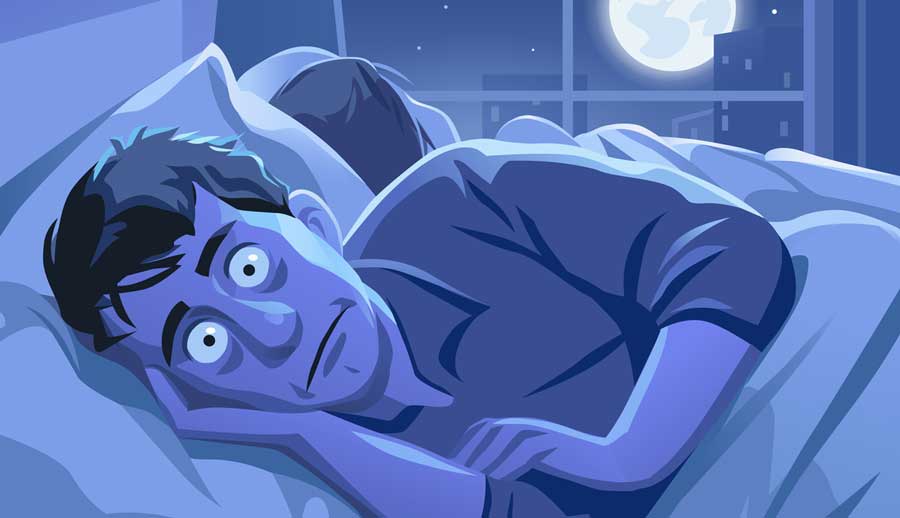Why Can’t I Sleep?

I Can’t Sleep, but Do I Need Too?
Besides having to endure a powerful desire to nod off watching presentations, not getting enough sleep can have long-term consequences. A lack of slumber can lead to an assortment of health issues: high blood pressure, heart disease, unhealthy blood fats (cholesterol and triglycerides), weight control issues, type 2 diabetes and colorectal cancer.
When you don’t sleep, your body lives on high alert; your heart beats differently, inflammation happens easily, emotions run rampant and moods can vary. There can also be deficits in your brain’s performance and memory. (Yikes! That’s where productivity goes out the window). Getting ample shut eye may also ward off rampant emotions and varying moods – which perfectly describes toddler behaviour. Bet you’ve met a tired adult behaving this way. Perhaps the best version of you (and most productive) is the version who doesn’t burn the candle at both ends.

How Much Sleep Do I Need?
Life can be busy yet, scheduling in some time to snooze may be the most important meeting you’ll have all day. How much sleep do you need? The American Academy of Sleep Medicine came to the consensus that healthy adults should sleep 7 or more hours per night on a regular basis to promote optimal health. About 60 percent of Americans do this, according to the National Health Interview Survey (2004-2007). But, the news isn’t so great for those working more than 41 hours per week, you’re up to 40 percent more likely to sleep fewer than 5 hours a night, compared to those who work 1 to 34 hours per week.
Is Not Sleeping Preventing Me from Losing Weight?
“Sleep is devalued in our society,” says Pritikin Longevity Centre’s Medical Director Dr. Danine Fruge. Your body has a rhythm that helps it know when to be awake, and when to sleep. This is called the ‘circadian rhythm’. It creates fluctuations in your hormones, including those that determine how you store fat and if you feel full. “If you short change yourself…a lack of sleep will show up on your medical lab reports, and the scale…” notes Dr. Fruge. She’s seen many patients ecstatically happy when their sleep problems are uncovered “…because they knew they were doing their best to try to lose weight.”
How to Sleep Better
To understand why you can’t sleep, it’s important to look at your entire lifestyle. There may be a reason that can be resolved. “If you’ve never felt rested, hate mornings or, need caffeine than you may want to take a look at your sleep situation,” says Dr. Fruge. Firstly, are there any medical reasons (arthritis, neck pain, anti-depressants), that could be affecting your ability to get a good night sleep Are you being kept away due to too much coffee, fatty foods or alcohol? Combination of alcohol and fatty meals (particularly at night) can lead to digestive woes including acid reflux.
Before Bed Tips for a Better Night Sleep:
- Turn off electronics
- Turn off any lights
- Avoid highly charged conversations
- Keep regular sleep times (set an alarm for bedtime)
- Go to bed when you feel sleepy
Secondly, is a lack of physical exercise playing a role in your sleep woes? Being active and spending time outdoors may improve how well you sleep. In a 2017 study, researchers looked at whether physical activity and being outside effect 360 adult women’s sleep patterns. They wore GPS trackers for 7 days and nights which assessed the total time they spent outdoors, sleeping and being physical activity. Spending time outdoors in the morning doing moderate to vigorous physical activity helped these women sleep better.
“Sleep deprivation is an epidemic in our society,” notes Dr. Fruge. As a busy physician and mom, she knows how difficult it can be to get enough sleep. But, she practices what she speaks as she wants to show those who are struggling that professional success and health can both be accomplished without one coming at the expense of the other. Dr. Fruge is part of the team of health and wellness experts at the Pritikin Center who together help you discover how to improve your health, and help you get better sleep. “Part of the Pritikin program can include a sleep test…” notes Dr. Fruge. “Walking through life with poor sleep is a chore…so many say to me, ‘I didn’t know I could still feel this good – now, I might actually feel like exercising’.”
Time for bed? Sounds great considering sleeping gives your body a chance to repair itself. Can’t sleep? Make your bedroom into a safe haven of rest and recovery. Sleep comes more naturally in a cool, dark and quiet place. That’ll be easier to accomplish if you turn off electronics before bedtime (better yet, kick them out of the room altogether). Go ahead and tuck yourself in. And, if you like, use a calming fragrance such as lavender. Sweet dreams!
References:
- Recommended Amount of Sleep for a Healthy Adult | Sleep 2015 Jun 1;38(6):843-4.
- Health Consequences of Sleep Disruption | Nat Sci Sleep 2017; 9:151-161.
- Sleep’s Effect on Hormones and Metabolism | Int J Endocrinol 2015; 2015:591729.
- Sleep, physical activity and time spent outside. | PLoS One 2017; 12(9): e0182013.
- Sleep Duration in the United States | Am J Epid 2009 May 1; 169(9): 1052-1063.